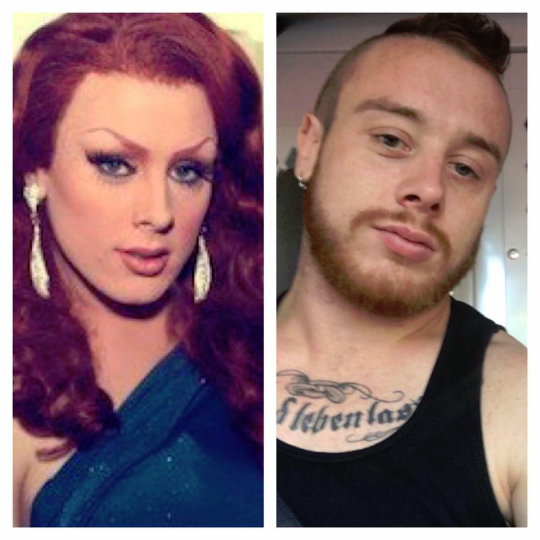
One of the youngest (and last) NYC drag queens to break through in a pre-Drag Race world, Dallas Dubois rocked nightlife with adrenaline-fueled, acrobatic, performances, and a true rockstar stage presence. Honing her production skills as the showrunner of Queen at Industry and the creator of Distorted Diznee at the Beechman, Dallas aka Danny Logan ultimately quit drag, bringing his stage skills west for a short-lived Cali adventure. His life has been a complete whirlwind of activity since he recently returned to NYC, with several new productions under his belt and a reload of Distorted Diznee in the works that’s already causing some controversy. Let’s catch up with an unfiltered Danny as he tells us about his life and career, his relationship with former co-star Logan Hardcore, his invention of drag suicide (!) and the whole Distorted situation.
Hey Danny! I see you went back to California this summer for a visit, after having lived there for about a year following the end of your run as Dallas DuBois in New York. What was it like going back there, as a tourist and not a resident?
It was wonderful to go back and see it from a different perspective, now that I’m back living in New York. It’s much better to be [back as a visitor in San Francisco] and not be in the “ground zero” of it, because then I remember its charm and appeal.
San Fran is so beautiful and fun. It’s so damn expensive to live there though, right? Even more so than New York, I think.
The Castro is the gay area there, and it’s the most expensive zip code in the country right now. It’s absolutely incredible what people pay for rent there. But even after the second tech boom, the city’s still managed to keep a little bit of its eclectic charm. You can go to that city and be whoever you want.
Here’s a quick story [from when I was living there]– it was a Saturday afternoon, at 2pm. I’m sitting, having lunch in Harvey’s, a restaurant on the corner of 18th and Castro, and I look up and there are these five naked men, with an average age of 55 to 70 years-old, just walking down the street. There was a mother and her child crossing at the crosswalk, not even turning their heads a second time as they walk past them! No shock and awe, just an “Eh, another day” kind of mentality. That’s when I knew I liked this city!
Did you ever watch Looking? I’m wondering if that’s a fair portrayal of the scene there.
I actually haven’t, but I heard from people who did, and they were kind of outraged by it: by the reflection of the city and the gay community. It was kind of the same outage people had for Queer as Folk. Not everyone in the gay community is a sex addict or a narcissist. It’s always stereotypes on television; he gay character is never a normal dude. That’s not the correct way to do it. I understood the outrage from people.
I get it too, but I think sometimes you need these really broad characters to tell a story. Exact depictions of real life can be boring! By the way, isn’t it surprising that there hasn’t really been a show about the New York gay scene? Or even a scripted show about the drag/nightlife scene in general?
I don’t feel like we’re necessarily at that point where it needs to happen. I think we’re still kind of far away from that, unfortunately. Although [drag] has been mainstreamed somewhat by RuPaul’s Drag Race, it’s still not there.
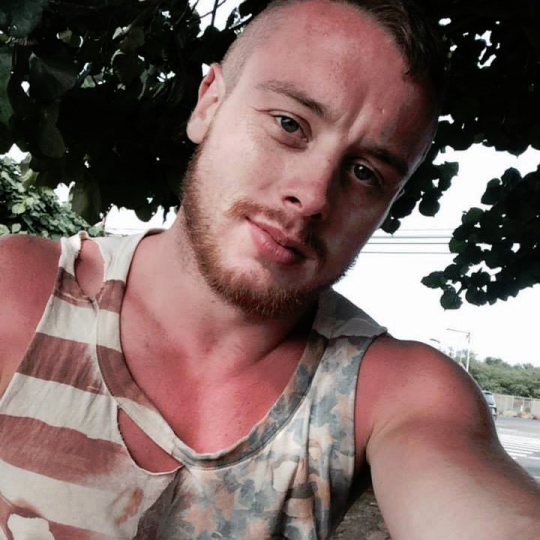
So, you’ve had an interesting last few years. You were in California doing your thing, and now you’re back in New York. Since you’ve been back, you’ve been constantly creating these stage shows, and putting stuff out there. What’s inspired this surge of creativity?
I started my new production company JAWdrop in August of last year. It had a slow start, because I wasn’t focused yet, and didn’t know what to do next. But now I do, and my main goal is to continually produce, create and direct new works of theater and performance. And also reprising old works with a new twist. For example, The Off Couple was a drag, and very gay, take on the classic Neil Simon show The Odd Couple.
And I also brought back the World Famous Electra from Florida and had her do a whole Bette Midler evening, where she did a small, abridged concert of Bette Midler’s famous moments and performances… completely lip synced from start to finish, with no pauses or breaks. So, it was actually like watching a concert; the illusion was never broken.
It’s been a diverse array of projects, for certain! We could use some new stuff in the scene here.
I definitely agree with that!
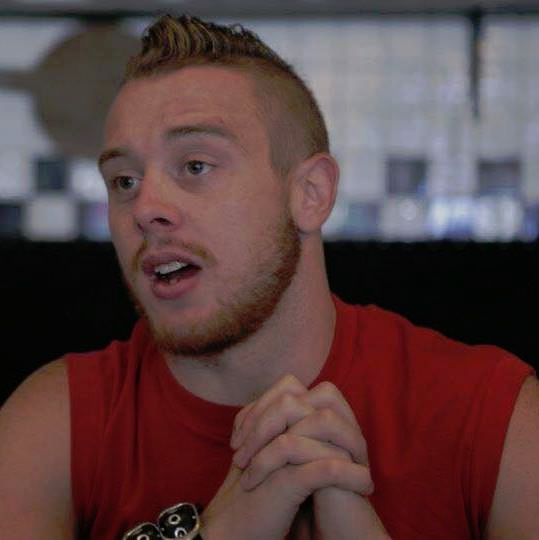
Also since your return, you’ve performed as your long-lived drag alter ego Dallas Dubois for a night at Hardware, two shows at the Duplex, and once on Fire Island. What’s changed since you’ve last been Dallas?
Well, I definitely realized the reasons why I did leave. I realized what made me remove myself from New York and from drag—it wasn’t something that necessarily made me happy anymore. I so thoroughly enjoyed the creative and performance elements of it, which is what I was reminded of when I came back and did these shows at the Duplex, and Hardware, and Fire Island.
But it was also a reminder that that was not what I intend to do anymore. In a way, I wasn’t necessarily doing it for me. I was doing it for fans and supporters who wanted to see [Dallas] one more time.
That had to have been something you missed when you quit drag: that community/intimate element of it. That’s a hard thing to replicate, even in the theater world.
I feel like, in the drag world—which is now glorified and glamorized by Drag Race and such—performers now have such loyal followings and appreciation from fans. A drag queen now is like the new celebrity crush. And a drag queen is still an attainable person that you can keep in communication with, versus someone like Beyonce–you’ll never meet her! There’s some type of humanization in drag. And there’s something about these performers that people can relate to, and keep in contact with before and after their shows, and on Facebook. It brings it down to a very human level.
I guess I never really thought about that. A drag queen is basically expected to be a Britney Spears who talks and interacts with her fans. That’s kind of scary, in a way! And a huge responsibility as an entertainer.
Something happened to me last week where I just said a joke [on Facebook] about Britney Spears’ VMA performance, where everyone is saying that she was going to do something she’d never done before, and I said “Yeah, she’s gonna sing live.” And people I never met before just came for me, and went crazy. What confuses me more than anything was that these people were defending someone that they were never going to meet, that they would never have any sort of connection with on a human level. And yet they’re willing to throw hatred at me, and attack my credibility and my integrity as a person and as a performer.
And I never understood that, and will never understand that. If you met me and didn’t like the way I was performing, that would make sense to me. But attacking someone you never met before doesn’t make any sense to me. It just seems like it’s empty anger that is never going to be filled.
Everyone wants a piece of the action, and I think that’s one reason why drag has been so well-received. People who want to be part of the drama can be part of the drama. Everyone has an opinion, and now everyone has a platform where they can say whatever they feel like. So if you are a drama-ridden person, and you want to fulfill that, and you want to use that gay verbiage or drag verbiage you learned from TV shows, then of course you want to be involved. You’re going to want to feel included.
And that’s what a lot of drag performers have done for people: they make them feel included, when while growing up a lot of people weren’t. They’re no longer an outsider, they’re part of something.
I just wish that people would have their own voice, but that’s just how some people operate, and that’s unfortunate. Or fortunate, which ever way you look at it!
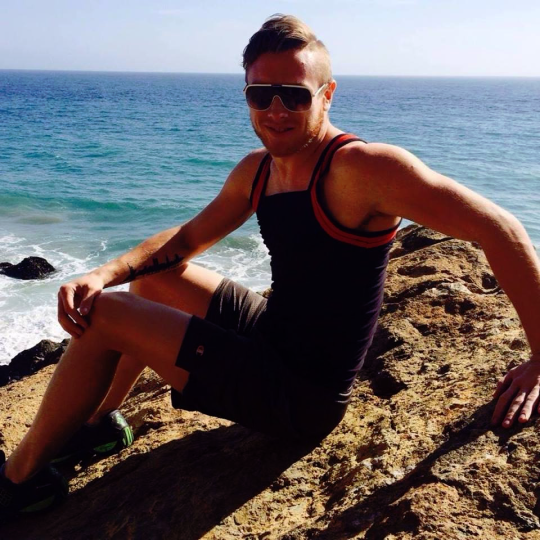
We’ll see how all of that evolves over time. So, let’s get some background information on you. What’s your hometown?
I’m from Seaford, New York. Long Island.
What was it like growing up there for you?
Not good. I still have family who live there, so I still go out there. And immediately when I get off the train coming from Penn Station, I still get this feeling of depression. It has nothing to do with the town, it’s just my own history and experiences there. I was always so surprised, being only 40 minutes from New York City, the biggest city in the world–it was still so closed-minded, and almost backwards.
It really is that way in some LI towns, like you’ve gone through a time warp to the 1950’s.
Exactly, and some people there still think that’s where they’re at. I was the only gay kid growing up. I had only one gay friend, but he assimilated into the popular crew, and I became the ostracized gay kid.
I had big buck teeth, and I was skinny, and then I got chubby,… I was always the kid that they were gonna pick on.
That must have been very difficult. Were you interested in theater and the performing arts, at that early stage?
Oh yeah, I know from a very early, early age that that’s exactly what I wanted to do. I always knew I needed to find an “In” to be on the stage or be around the stage. Even to this day, after doing the drag thing and moving to California to work in the theater company that ended up falling through, I always felt the most at home in a theater. Even more than in my actual home. I’ll walk into a theater that I’d never been in, and feel more at home there than anywhere else.
[Theater is] the world of infinite possibilities. They say with addiction and treatment for substance abuse that the first addiction for most people in life is fantasy…. that when you’re a young child, you become obsessed with the idea that the world is full of endless possibility. A lot of people get stuck in that fantasy, and I think that’s my biggest addiction in life. And that’s what brings you to the theater and the arts: the continuous world out there that you can create and do things with.
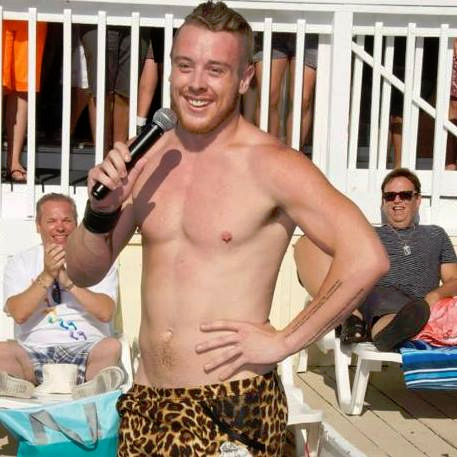
That’s interesting, because on your end of things these days–production and direction–you have to be somewhat grounded in reality, right? It’s like a compromise between reality and fantasy.
Oh don’t get me wrong, I still have plenty of work to do. I’m not at that point yet; I’m still learning from my mistakes. I’m not the most level-headed person when it comes to personal issues, and I feel that perhaps when I’m maybe being judged or critiqued in a certain way, I lash out when I probably shouldn’t. That’s just me, still trying to find the homeostasis level!
So why specifically did you come to New York City? Did you go to school here?
I went to school for scenic design, for stage and film. And I still was pursuing acting growing up. I couldn’t get work as an actor for… ever. And something just told me one day that I needed to go to school for scenic design, to fall back on–so I did. But my heart was still in performing. So I was given the opportunity to either stay with the college and continue my degree, or leave for Los Angeles to pursue acting, which is the one that I chose, before Dallas came around at all. And it did not work.
So I then I moved back [to New York], and found Fire Island. I didn’t even know it existed, [even though] I grew up in Long Island! And the rest was drag career history.
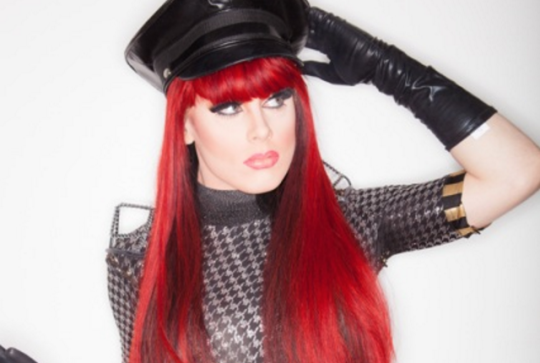
Do you remember the first queens that you were seeing that lit the fuse for you?
I remember Ariel Sinclair being one of the first drag performers that I saw. I also remember seeing Ginger Snap when she was working at Lips; I snuck in on my 19th birthday and said that I was 21. We dressed in drag—my first amateur drag name was Holly Wood! I went with six friends, and we had a great time. I don’t remember much of it, but I remember it being a good time! That was my introduction to drag, Fire Island and that birthday at Lips. There was just something about it that made me say, “I want to do that.”
And also, [another influence was] the first revival of La Cage Aux Falles with Harry Beach which was absolutely stunning. There was just something about what they achieved with these beautiful, muscular men turned into ladies on the stage–so glamorous, with all the feathers and rhinestones, hair and makeup… there was just something about it that was so inviting. I was so curious about it, so I went with it.
Was Drag Race on TV at that point?
I came into the scene the year before Drag Race began. Me and Logan Hardcore—which is kind of the basis of why we have such a tumultuous past—we were the last two “beat me queens” that came in before Drag Race spawned 95,000 other ones. We were compared to each other a lot because of it. We looked somewhat similar, we were very agile, we worked on Fire Island together–so a lot of people compared us to each other.
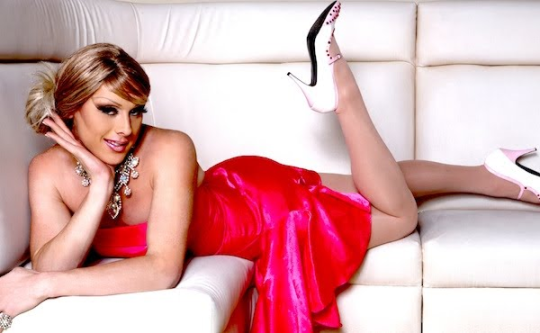
A lot of people who talk about your early drag career mention your first professional drag alias Baby Powder, and what a busted hot mess she was. But you must’ve been doing something right, because they remembered you!
Yeah, she was a sight for sore eyes, that’s for sure. I was so naive, I didn’t realize the double-entente of “Baby Powder,” but it made total sense because it looked like I did massive amounts of drugs, with the color palette I used and the hair and everything.
Who helped you ultimately refine your look and learn the business?
I would be lying if I said I didn’t get any help. I did watch a lot of YouTube tutorials back in the day.
I was doing Star Search at Barracuda many years ago when Shequida was hosting it. I had won three weeks in a row, and was feeling my fantasy. Then someone came up to me and said, “Hi, you look busted.” And I was like, “Um, thank you?” And he said, “I want to help you. You have the potential to be really pretty.” So I told him thank you, but I knew what I was doing, and he grabbed my arm and said “No, you’re not pretty, but you can be. And I can help you.” So he took me in and helped me refine my look and find my voice. And I went through a couple of different names before I settled on Dallas.
Who was that, the man who helped you?
He ended up becoming a friend of mine, his name is Stephen. We’re no longer talking.
He played the role that he needed to play in your life.
Yeah, and for that I’m grateful. But that’s about it!
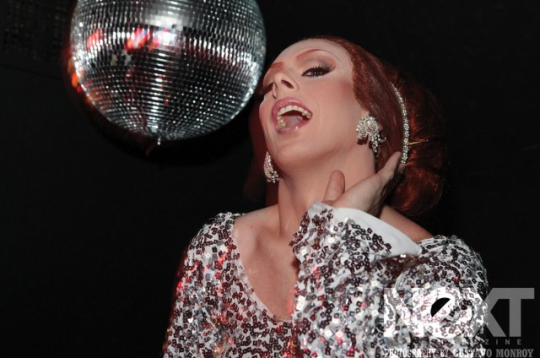
Got it. One guilty pleasure of mine that I love to watch is the short lived, but still fascinating, Queens of Drag NYC.
Oh, Lord!
I guess when Drag Race came along, it ruined the chances of that becoming a hit show. I think it would’ve been great, though! It would’ve been so educational for everyone as far as that aspect of drag that not everybody sees—the day-to-day stuff.
We shot the pilot, I believe after Season 2 of Drag Race had just aired. There wasn’t enough of a market for it, because there was already this one show [about drag] that was doing well, and they didn’t want another one. So they decided to turn it into a web series to see if it would gain interest.
The show depicted you and Logan working a pool show together at the Ice Palace. Were you and Logan really at each others’ throats that much, as depicted in your scene? Or was that exaggerated for the episode?
Oh no, it was very true!
Things seem much better now as far as that relationship is concerned.
I disagree!
Well, maybe you can be cordial now because you don’t have to see each other as much?
I look at that as the biggest blessing in disguise. She’s a very hard person to become friends with—to have a nice, authentic relationship with. And I know that it’s just not in the picture for us to be friends anymore.
But I think she’s softened recently.
The only place where she’s softened is around the waist. [Laughs] you can put that in the interview!
The shade! Sorry Logan!
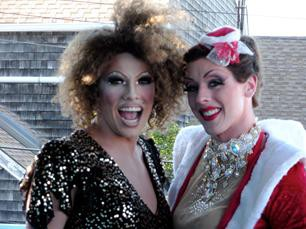
Was that your first weekly gig, at the Ice Palace?
My first weekly gig was at the former Oscar Wilde Bar, now called Evolve. And then the next one was Boots & Saddle. I got the Fire Island gig the same year I got Boots & Saddle—I would go back and forth every week.
So, where did you meet a lot of these queens that you’ve been friendly with and worked with, whom you maybe came up around the same time with: queens like Holly Dae, Pixie Aventura, Bootsie LeFaris and Brenda Dharling?
I met some of the girls out and about. All of those girls and I eventually became friendly and very, very close. We would do two or three shows a week together, we would guest at each others’ shows—we became a really close-knit family. But I started out before those four. Brenda came last. I believe it was Holly, then Bootsie, then Pixie, then Brenda.
When you were all doing Queen at Industry—which was a huge deal and still is, being the biggest weekly drag revue in the city—when you became the showrunner of that, you took over for Shequida, right?
Yeah, Shequida started the show, and then she left the show, and it became Peppermint and myself rotating for a time. And when we realized there were different directions we wanted to go in, I became the full-time host.
And that was your fist experience with the production level of the stage.
It was definitely an eye-opening experience, and I think it was altogether my first all-inclusive experience. To be not only hosting it, but to be producing it, directing it, organizing it, promoting it, making the costumes, making the set pieces… all-in-all inclusive. It was a very demanding job.
Did you ever stop to think, “Oh my God, I don’t know what I’m doing,” or did you instinctively just actually know what you were doing?
It came pretty naturally, which I was surprised about. I thought it would take longer to get where it needed to be.
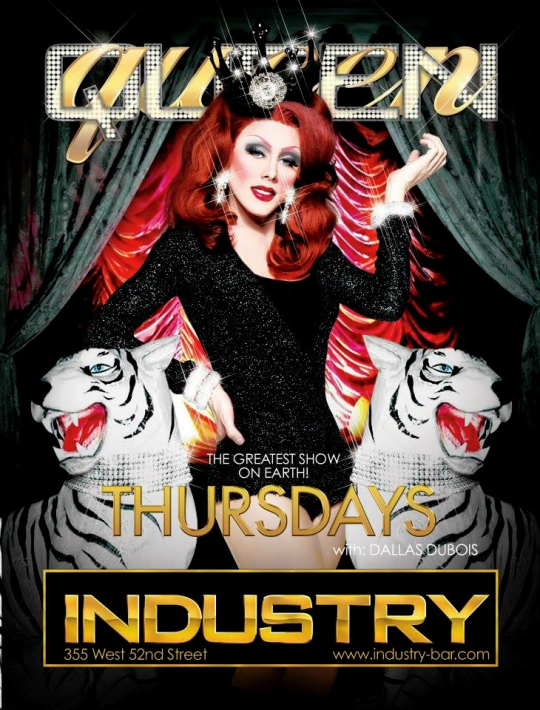
And you were happy doing Queen, for awhile at least, right?
Yeah, I was happy doing those shows, because they pushed you every week. We had the opportunity to push ourselves in a way that we couldn’t get otherwise, because of the usual limitations that prohibit you. Usually you have no room, because you’re performing in a venue that doesn’t have enough space for a dance number. Or you would have to take a break because you’re the only one actually in the show, so you can’t do costume changes, you can’t do wig changes.
It gave you an opportunity to really push yourself as a performer, because the norm became people wanting to be entertained at a very high level. Which is a wonderful–but also very intimidating–thing to have! You know, it’s like, “last week I juggled poodles on the stage, now what am I gonna do?”
It must’ve been the best education.
We called it Drag Boot Camp.
I remember, I guess around 2012, when I saw you emceeing the Folsom Street East Festival on that large outdoor stage they set up in front of the Eagle– you were like a rockstar. And it was really eye-opening for me, because I never knew drag could be like that. You wee vamping on the stage like Mick Jagger, jumping and running all over the place.
Yeah that was from, um, a couple of different things! There was actually this flight that Holly Dae and I had taken from Europe, and we were jet-lagged. I had gotten off the plane, and was doing my eyebrows in the taxi ride from JFK to New York. By the time that I got there, they pushed my performing time down two hours. But what that did do was give me and my friends the opportunity to go to the bar down the street and get a little intoxicated. So when I did my show, I was definitely buzzed and feeling my fantasy. And it was just pure adrenaline that took over.
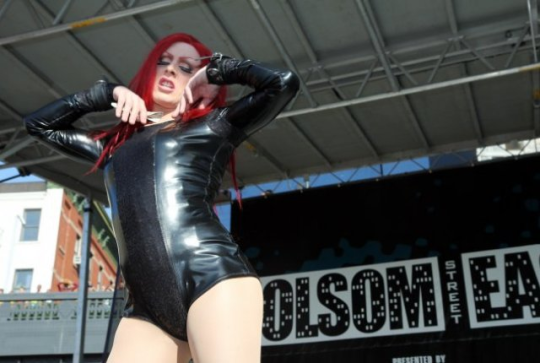
I remember [at one point during that show] running up to the High Line [which was right above the stage] and interviewing these random people there who were gawking at us. And the interesting I found out was, with the original time slot I was supposed to perform—at that same spot where I talked to those people, two hours prio–was the Westboro Baptist Church. I missed them, thankfully, because I get a little confrontational with people who are judging me like that. So it was probably a blessing in disguise that they pushed the start of that show. It could’ve gotten ugly!
That would’ve been something!
A: And I remember after I scaled the High Line and came back down, and when the adrenaline went down, Holly and a couple of other friends who were in the front row were pointing to me while I was on the microphone, and I looked down and my leg was just bleeding profusely. And I was like, “Oh well!” and just kept going. All in a day [laughs]!
Oh, I remember the blood! And I remember during your final show as Dallas in Industry, you were a corpse on this dais in the opening number, and then somebody hit you and you fell hard and flat like a real corpse onto the stage and basically rolled off.
I had a bruise from that for awhile!
Were you always so physical in your performing, and were you never afraid of getting seriously injured?
Yeah, there are many times where my adrenaline kicked in so much, that… well, I look back now, as an adult, and I’m like, “Holy shit, I could’ve died!” I would scale the roof of the Grove Hotel in five inch heels—just from pure adrenaline, and heat stroke, and alcohol. I always used to do anything to make people laugh. It’s a pure showboat mentality. I think it’s better to push the envelope than to be mediocre or boring.
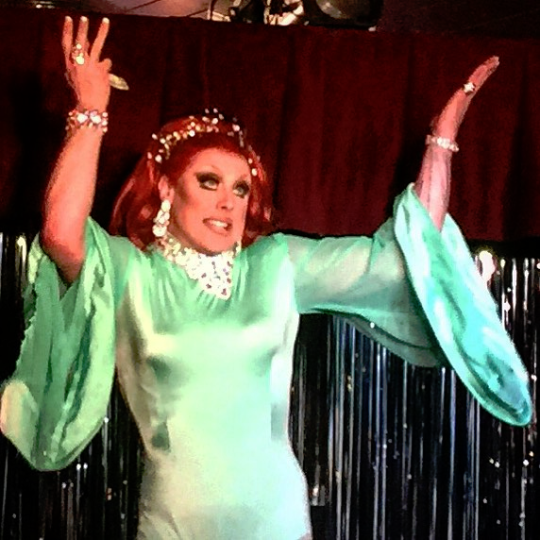
When you performed those recent shows as Dallas after you came back to New York, you’d become a very different person physically than you used to be: a pumped up, beardy gym rat! Was it a huge adjustment to reconfigure your drag onto that new body?
Long sleeves was the way to go! It’s hard to recreate something in the way that you’re used to, and then to have to modify it. But I looked forward to seeing how to get around some things as a challenge.
I’ve always wanted to be bigger and muscular, but I never could. I always wanted to have tattoos, but I never did because I always wanted to have that one kind of look in drag. So it was wonderful to have that challenge.
It means that my exit from drag did not go for nothing. I wanted to have this transformation, it’s one of the reasons why I left. It’s the self I always wanted to be, but never could be.
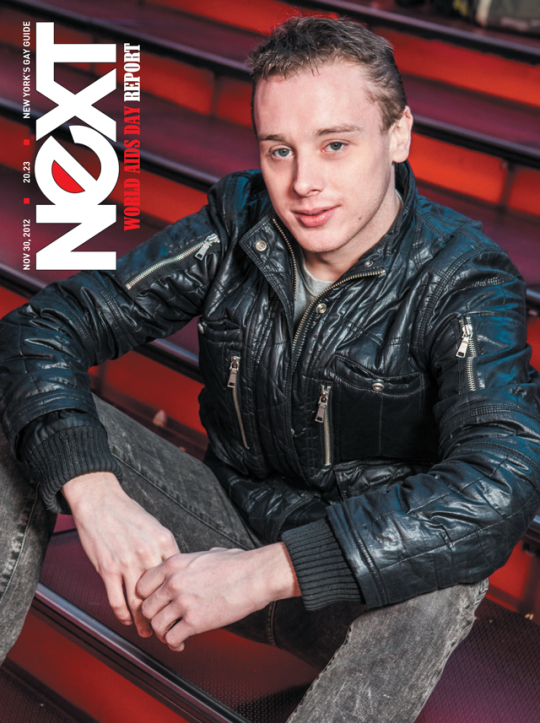
You’re HIV positive, and you’ve always been very open and honest about that. You’re an activist, and you’ve worked for many HIV-related causes. What do you feel about peoples’ sort of blasé approach to the virus these days? Does it upset you that people aren’t taking it so seriously anymore?
I would say that I am not unhappy with that mentality, but I’m also slightly saddened by it too. What I mean is, it’s nice that people react that way when I tell them about my status. They no longer have that stigma to the level that it was before, that they’re going to get it by touching you or kissing you.There’s such a lack of education about it still to this day, thirty years later.
But the important thing is that people are not taking it seriously, and they’re still doing their promiscuous routines that would put you in harm’s way to get it, and other things too. People are taking PrEp, which is a wonderful thing—I actually am in complete support of it. What I don’t like is, people aren’t thinking of the other STDs and infections they can get. I think there’s been like a 400% increase with gay men in cases of gonorrhea and syphilis, and chlamydia. But there is a decrease in HIV.
And then, when we let these other diseases run rampant, they can evolve into other things and become more difficult to treat. I guess people aren’t thinking about that, right?
It’s not that people are thinking about it. It’s interesting, I recently acquired an STI, and when I mentioned it to my mother, she reacted in a way that I was just not used to. In the gay world, it’s not as abnormal to acquire an STI because we’re much more sexually active.
It’s a rite of passage, almost.
Yeah. It’s interesting to see the ways that different people look at it. I look at it as something that you can just get taken care of tomorrow, other people might look at it as almost completely the opposite.

I remember your performance at the final Odyssey Awards, as Danny, with Tina Burner. You two were lip syncing some sort of comedy skit… what was that?
A: It’s from Inside Amy Schumer. She does this scene called “The Third Date,” where she goes on a date with this guy, and the guy says “Amy, I really like you and want to see more of you, but I have to tell you something.” And he tells her he has full-blown AIDS.
So Tina Burner, who’s my friend, her and I are on the same page as far as pushing the envelope and getting people to talk, maybe creating conversations about some things we do in life through performances… and if they’re not talking, then there’s something wrong. But this was something that we wanted to do, and we were totally on board and went for it full-fledged.
It was a fun number, but did you get shit from it? Were people offended?
That’s kind of why she and I did it together, because if I can laugh at it, then it would be different if she chose someone who wasn’t positive, or wasn’t open about their status. Like, “Well, I’m not offended by it, and if I’m not offended by it then it’s okay.”
It was entertaining, but that was a strange night in general. There was just something in the air.
Yeah, it was a strange night.
So, you’re credited with inventing drag suicide! That’s where drag queens have to lip sync songs not of their choosing, that they may or may not know the words to.
Yes. We started it at Evolve. Me and a deejay called Paul Leasure, he’s one of the managers at Therapy now. He and I used to do it at Evolve, and I brought it to Boots & Saddle afterwards, and it kinda took off from there.
It’s become a drag tradition all over the country! Are you proud of that?
I have mixed feelings about it. Some days I just enjoy it, and I don’t care about getting the credit. But other days I’m like, why is everyone still doing it? I mean, everyone. Can we find something new and original?
And lots of queens don’t even really right! They only want to do numbers that they know–and that’s not suicide, that’s just filling up time in your show.
Yeah, the point of it is, you’re supposed to just get through it, no matter what. People wanna see you squirm and sweat a little bit, because you’re a little uncomfortable with not knowing what you’re doing.
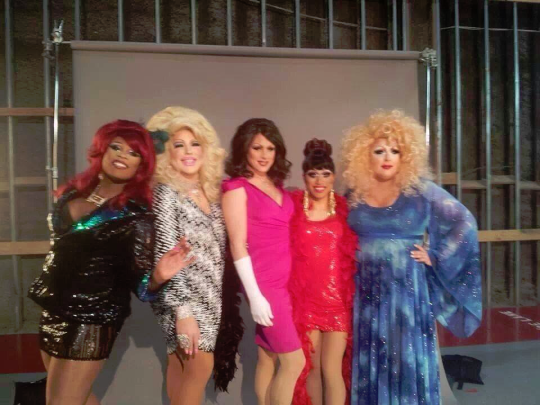
Another claim to fame of yours: you played corpse-of-the-week Tiffany Lamp on an episode of Blue Bloods! Was it surreal to watch Jinkx Monsoon crying about your demise to Donnie Wahlberg?
[Laughs] Yes it was. Such a fun work day. Donnie Wahlberg and Jinkx were so sweet to work with.
Let’s talk about Miss Hell’s Kitchen from July of this year. That’s a major pageant and HIV benefit that you produced. Were you happy with how that turned out?
It was my first year producing it. It was a little stressful for me, and I felt a lot of pressure to do everything the right way. I wanted it to be bigger and better than last year, and I was happy with the results. However, there were some unforeseen circumstances that made us have to do the show in the summer. I learned my lesson, and we won’t do the show in the summer anymore, because it kind of affected the ticket sales a little bit, that we ultimately were going to donate to Cycle for the Cause. But for the future, I’ll know to continue in May or April, like it had been in the past years.
Also, I definitely enjoyed the venue, but I want to find a venue that will be more appropriate for the next coming pageant. The venue was wonderful, and so accommodating. But I kind of want it to go a little more like physical theater. I want a theater with a fly system, and curtains, and lighting, and tracks. I want it to be a big event, and do a lot more with it.
It’s strangely hard to find medium-sized theater spaces like that in this city, right? We have tons of these tiny little holes-in-the-wall indie theaters, and these giant Broadway houses, but precious few in between.
It’s unfortunate that a lot of these 200-300 seat theaters tend to be overpriced. Which is strange, because the type of productions that you would have there don’t tend to make a lot of money. So they mostly hold corporate events.
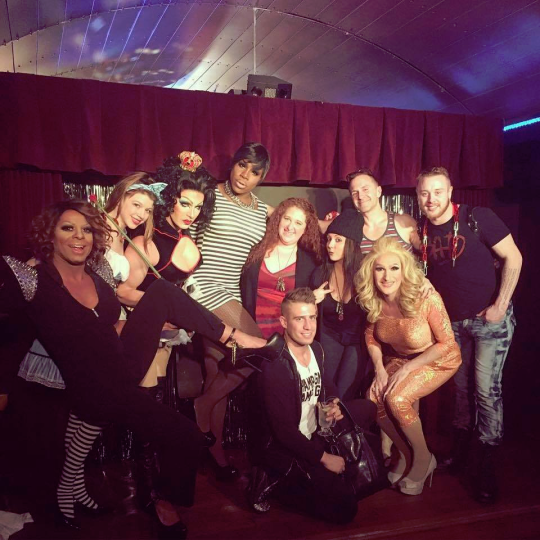
Now let’s talk about Distorted Diznee, which was a drag showcase for you and your then-sisters to send up famous Disney songs and moments. You started that when?
2011 was the year it was created, but it came to the Beechman in 2012.
Was the Beechman drag-friendly in the way it is now when you brought the show there, or was that kind of new for them?
Definitely not to the caliber it is now. Now it tends to be a haven for Drag Race girls with their solo shows. But before it was much more cabaret, singing, off-Broadway, Broadway actors that want their own show. Jackie Beat was there before us, and she paved the way for drag performers to perform there.
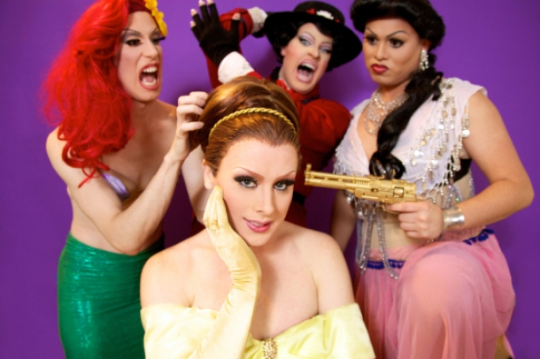
What made you want to do this show?
It first started out as just a two-show special engagement, just something different.
Disney was something that really lends itself to drag queens. It was whimsical, and fantasy-like, and it was probably already one of the most flamboyant pastimes of the world’s history. Everyone knows Disney. If it’s Paris, if it’s Tokyo, Orlando, Anaheim… everyone knows it. It’s the most beloved cultural phenomenon, I think, ever. It’s pure look and content are flamboyant already; to add drag queens to it seemed like a given, like such an obvious choice to do a play on it.
So I decided to get into it, and asked the girls to join me, and it became so successful that we were asked to continue it after the two shows, for a month or two. And after that block of shows, we had a sit-down and decided that we were gonna continue to do the show indefinitely, with an open-ended run, because it was so successful.
When you were all doing that show at the Beechman, it wasn’t just attracting your typical gay nightlife audience. There were lots of straight people, families and children, Broadway theater-goers.
When I saw you all perform there–all being Holly, Bootsie, Pixie, Brenda and yourself–the audience was going wild for you. Everything you all did, they screamed and cheered like you were the Beatles in the 60’s, largely because they weren’t all jaded and desensitized like gay bar-goers. It was all new and fresh and fun for them; plus, you of course were all so talented. Were you all prepared for such an enthusiastic and non-traditional drag audience like that?
When we first started it, it was purely promoted to gay men and women, because that was the community that we had direct access to. When it became a big hit, those who saw the show told everybody to see the show. So it went from gay men and women, to straight women, and then the straight women brought their husbands, and then the gay men kind of fizzled out for awhile. And then came the bachelorette parties and bridal showers… so, it’s kind of gone through its own Renaissance, in a way.
But right now, I can’t even tell you what market it goes to. It goes to pretty much everyone now. Someone has talked to me about doing a show at a casino, and a resort in the Poconos on November 12th.
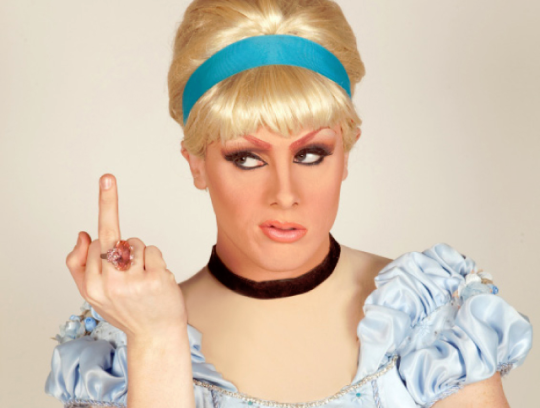
So, why, ultimately, did you leave New York, and drag, after all this success?
I was actually approached by a friend that I used to work with. He was opening his own theater in Los Angeles, and he asked me to come on board for this theater company as his creative director. So I would be continuing my theater producing experience, but now on the West Coast and sans drag.
And you had no intention to bring Dallas with you to Cali?
No.
So your last show in New York before you left, at Industry, was epic. All you Queen girls did really lavish numbers, Bianca Del Rio made a surprise appearance and performed as you, Shequida and Logan ran up to the stage with you. It was very memorable, very emotional. Do you remember that fondly?
It was nice! It seemed like everyone put their egos aside, and we just had a nice night of goodbyes and remembrance. It was so refreshing. And it doesn’t quite happen so much anymore!
So while you were out there in Cali and things weren’t working out with this theater, were you starting to come up with these ideas for productions that you wanted to do back in New York?
When I moved to California to work in the theater, I was put on retainer, waiting for the company to come to fruition. There was a portion of the company’s business plan that had to happen before they could open the theater.
So, I sat for six months in my apartment, and was given half my pay, which was under contract. And I would be in my apartment, or at a coffeehouse, just creating these shows and events that would come to this theater. So, I would have all these ideas that would come to me every day. I would go get coffee, and I would get an idea, let it boil for a bit and come to a clearer understanding of what I wanted to do with it.
When I lost my job and the company went kaput, I had all of these great ideas, and no place to put them. And I didn’t want to live in Los Angeles to begin with, so I hightailed it over to San Francisco. I had just brought a brand new car, and all this furniture. And I always wanted to live in San Francisco, and I thought it would be a great place to bring theater to and try something new.
When I got there, it was a wonderful place, but I was faced with a ton of immediate “Nos”, because people did not know me. They didn’t know my body of work, or what I could do. People just didn’t understand it, so they were very trepidatious to take me on. Nowadays, I feel like if I came back, it would be different.
Because you’re now established, and have a researchable body of work here.
Yes. And I knew that the place I needed to go was back to New York. I had all these contacts from when I was doing drag that were so hard to meet. So I just brought all the ideas that I had intended for California back to New York. And that’s kinda what I’m doing now, at my own pace and speed, with only me to really answer to.
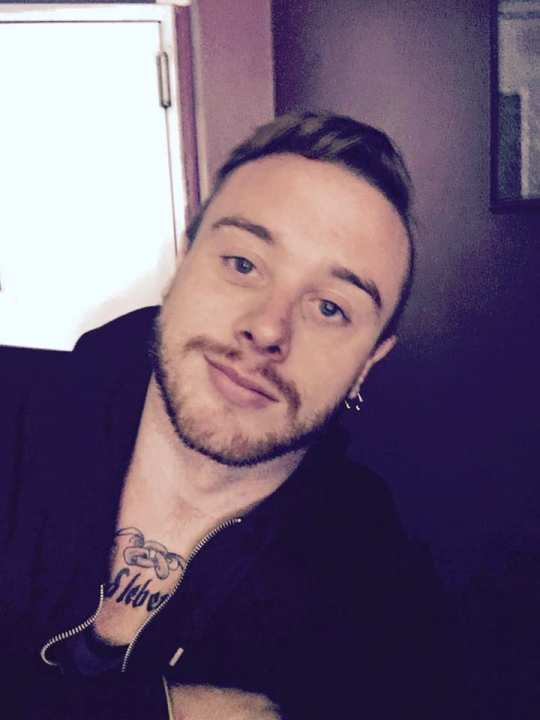
While you were in California, what was the understanding regarding Distorted Diznee? The other queens were continuing the show in your absence. Were they doing it with your blessing?
Yes, at first it was with my blessing to continue the show while I was gone. I didn’t have a set timeline for my return, and I gave them my blessing to continue the show with my input when needed, but it was very rarely when that would happen.
But ultimately, were you happy with the way the show was handled while you were gone?
No.
So it was at that point, after you got back and caught wind of this, that you wanted to publicly disassociate yourself from the production, because you weren’t on board with the direction it was taken in.
Correct. It wasn’t my personal vision anymore. There was a clear indication of that from when you came to see the show when I did it, versus presently.
And it was very important for you to make it clear to everyone, for your reputation and livelihood, that you were withdrawing your name from the current version of the show, despite how some people might react to a statement like that.
Right. I can only account for my personal involvement, and the blood, sweat and tears that I put into it, and in revisiting it and seeing it again, I saw something that doesn’t equal the level of the quality that I would produce. The last thing I would want as a producer would be for anyone to think that I had any hand in it.
So now in the meantime, you are going to return to your own vision of Distorted Diznee. When did you decide to make this new version of the show?
Well, I had the show trademarked, and now I own it. According to common law, it’s in the process of becoming my trademark. The paperwork is pending, but it’s all there, and according to all legal verbiage it’s technically now mine. So I felt it was necessary to take it a step further and continue with this franchise and brand that I created, and elevate it a level. I have intentions for this going on the road, to other cities and states, perhaps to other countries.
There are so many different possibilities in the future. And I saw that where it is currently, there’s no potential for it move forward or grow, because nothing has changed in two years since my departure.
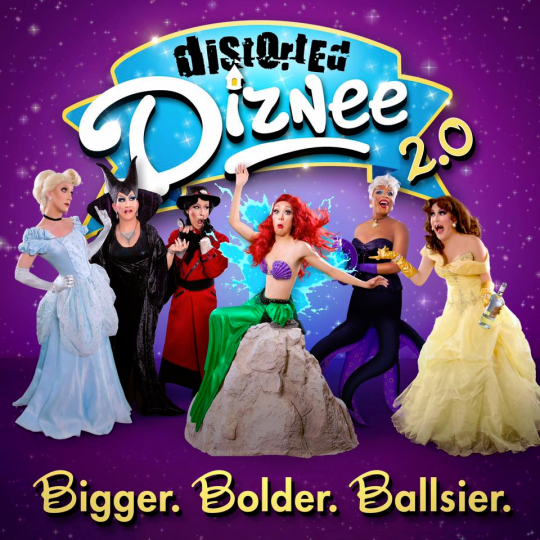
So, I’m looking at the picture you posted of the cast you’ve assembled for the new version, and I see Chelsea Piers, Sutton Lee Seymour and Pattaya Hart, who are all wonderful. And who is that Mary Poppins?
That’s Shenea DeDranke, one of the original cast members back in 2011. He doesn’t do drag full time; he’s actually an actor. He travels a lot and does tours. I wanted to bring him back, but he’s not going to do the show full time.
And I see Peppermint there too. She might be otherwise occupied now though, right?
I know she’ll be in a couple of the shows, and we’ll take it from there!
All of the new cast is so phenomenally talented, and as a full cast they feel somewhat new and fresh. They’re eager to perform, and enjoy the process. And it’s not going to be a competition, they are treating it like they are all parts of the group. It’s going to be refreshing.
Do you guys have any dates or venues yet?
October 15th. It’s at a venue called the Red Room. On 53rd and 8th, in the Broadway Comedy Club. The shows are going to run Thursdays and Saturdays at 8pm every single week.
Basically, the theater has turned into the Distorted Theater. They’re letting me retrofit the show into the space, so I can build my audience again as I recreate the show.
This must be very exciting for you, it’s a huge deal!
I’m super excited. The backlash [after my announcement of the new version while the current one is still in production] is attempting to trump that, but I won’t let it. It’s going to be exciting to see this very long journey that I had planned for finally take its course. Who knows what infinite number of possibilities in which this franchise can go?
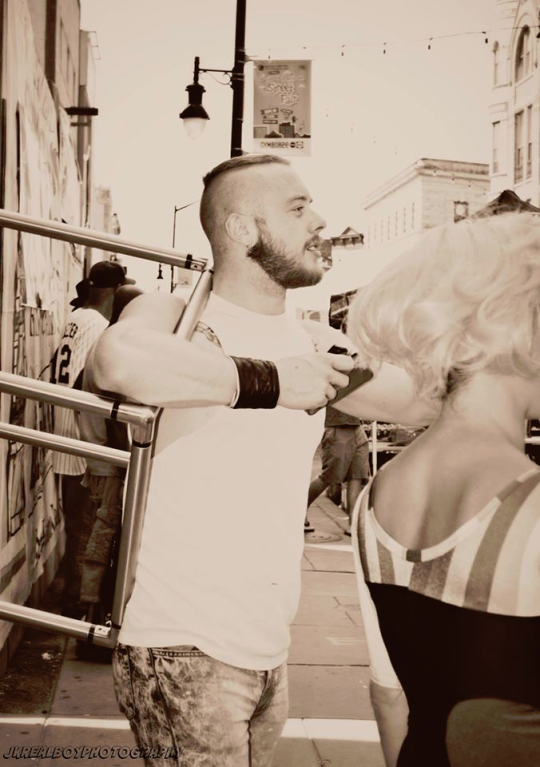
Do you think, or hope, that things will blow over with all people involved in this transition? Or are you just moving forward at this point?
I hope they realize that it’s a battle that doesn’t need to happen. I’m just someone that’s trying to get back what’s rightfully theirs, and then bring it to bigger and better places, and continue on with future endeavors. But right now, everyone is taking everything very personally, including myself. It’s a matter of personal egos and strong emotions. And former friendships.
It’s never easy; it’s a very sensitive subject. Everyone seems to have their own opinion, and the only thing I ask of people is that if you aren’t directly involved—if you’re not one of the four cast members, myself, or the PR company or Laurie Beechman—give us the space to figure this out, rather than post an opinion [on social media], because it’s not helping anybody. It’s actually hindering everyone’s morale. It only involves a handful of people, but everyone wants to chime in on the drama.
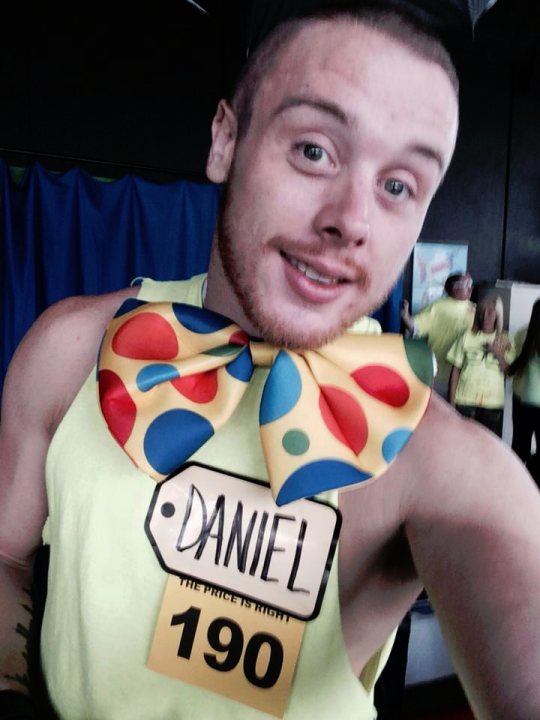
Are you still bartending in Hardware, which you started doing when you returned to NYC?
I decided to leave in May, because I needed to go in a different direction. I’m still great friends with the staff, and I loved working there.
A lot of the queens in this new Distorted came through Hardware with shows and appearances, like Sutton and Chelsea.
There’s so much potential in them. [We’ve watched them] grow in the city as performers, and really become the new queens to look out for–it’s very impressive. They’re wonderful performers with great energy, they’re humble, they have a nice working dynamic. And a lot of people forget about that stuff when you get into this business.
And this is going to be a great new venture for all of them! I think once these legal issues blow over and the new show opens, it’s going to be very well-received.
I hope so!
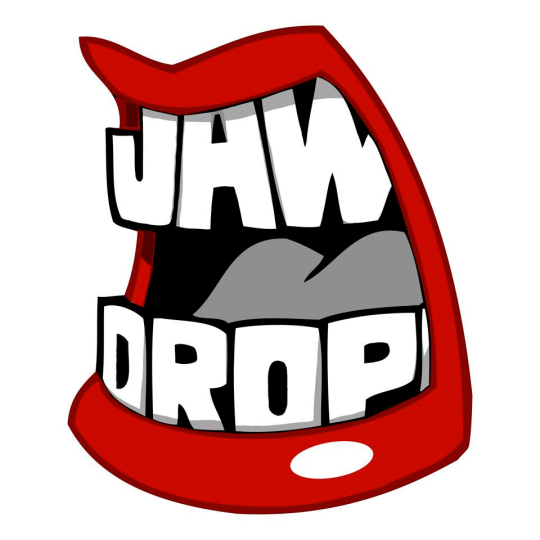
Do you have anything else in the works?
I know in the coming months, we’re going to be doing a second revamping of “The Off Couple.”
I interviewed Blackie O about doing the first version of the show that ran in the Duplex. She loved it and said it was a great experience, but she said nobody knew their lines.
Yeah, it was challenging to sit with the script and watch the show, and know that they don’t know the words! I would have been upset as a producer / director, but what really made it wonderful was that everyone that came to the show actually wanted that to happen. They’re not paying $120 to see a Broadway show, they’re paying $20 to see a drag queen play in a converted loft apartment! There’s so much irony there. It shouldn’t be surprising that people didn’t know their lines.
Yeah, Busted and Tina were the leads, who wouldn’t want to see them go off book and be crazy?
The first night, the energy was magic and so much fun. So many hiccups and funny moments that were unplanned, that you could never recreate. I was belly-laughing and crying with laughter towards the end of it. That’s what I love about theater! That’s what everyone wants to do, but very few people actually get there.
So, how are you going to revise The Off Couple exactly?
We’re going to bring it back with a different cast, to keep it fresh. It’s going to be at the Red Room.
So that will be your home base now, for future productions.
Yeah, they’ve been so enthusiastic. They’re so eager, nice, and on top of things. When they accepted my original pitch right away, I thought, “Wow, this is refreshing!” They’re looking forward to what I can bring to them.
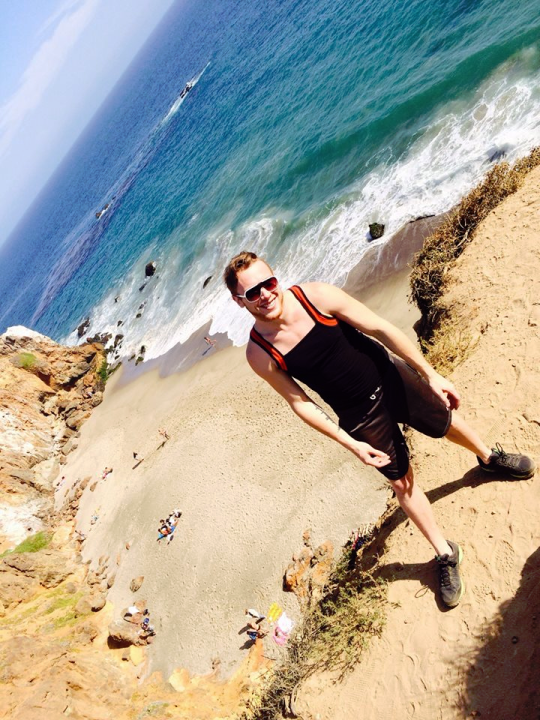
So, let me ask you this: what would you say to someone who wants to go out and create art and make things happen the way you have been doing now, but is plagued with self-doubt and uncertainty?
I would say to have conviction and belief in whatever it is that you are passionate about. If you don’t have the passion, you’re going to be lost. It could be a passion for anything: mac and cheese! You really love mac & cheese, so go all the way or go home. If you have a passion for producing or creating, don’t let anyone tell you that something is not good or not right. I can give true testament that things I thought would be wonderful have flopped, and things I thought would flop have been great. Don’t measure your successes with your failures.
Well, I wish you and everyone involved the best luck with all these developments and accomplishments!
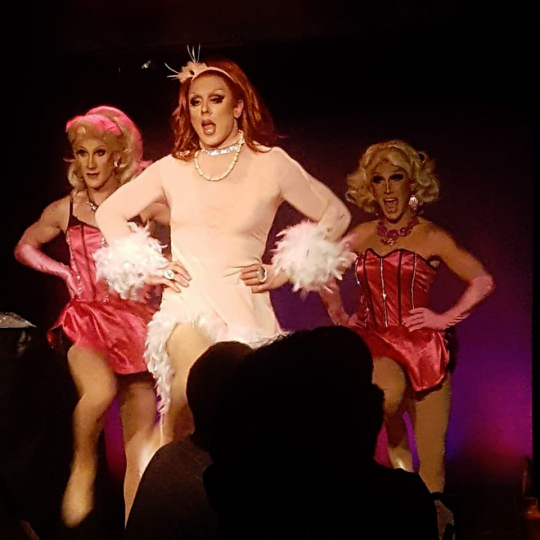
So finally, what about Dallas? Is she back for good, or is she out of your system?
She’s out of my system, for quite some time!
Well, you got to sing live as her, though, in your last Duplex show! That was a first for you. It sounded good!
Thank you! I’ve said before that you should do something every day that you’re afraid of. There’s no other way that you’re going to grow as a human. So against my better judgment, I did it! I felt good about it afterwards, that I did it for the right reasons.
And now you can produce the Dallas DuBois stage musical.
Definitely! From New York to Dallas!
Thanks so much, Danny!
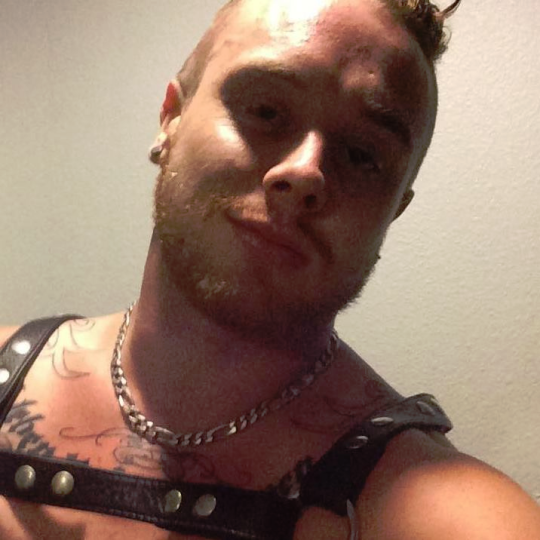
Danny Logan will be producing a revised version of Distorted Diznee at the Broadway Comedy Club’s Red Room, beginning October 15th (8pm). He can be followed on Facebook, and on a (as of now) pending website for Distorted.

2 thoughts on “On Point With: Danny Logan”